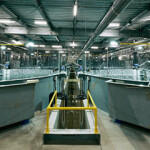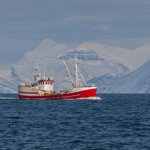Jerry Knecht offers government-relations lessons for seafood-focused NGOs
A veteran of the American seafood industry, Jerry Knecht is the founder and president of Bali, Indonesia-based P.T. Bali Seafood International and North Atlantic, Inc., which has its headquarters in Portland, Maine, U.S.A.
SeafoodSource: How did you wind up starting a company in Bali?
Knecht: In the 1990s, U.S. government policy resulted in a collapse of the local fishery within the 200-mile limit. Seeking a survival strategy, we went to the Pacific Rim and also started processing Atlantic salmon from Canada. And then, in 2002, we switched focus to Asia. I asked lots of people if I could buy their tuna. We took over a niche on the supply import especially of private labels and did a better job than some competitors. We’ve since evolved into a warmwater seafood company with an emphasis on sustainability and social impact.
SeafoodSource: Why did you found your company on sustainable principles?
Knecht: In 2006, I attended the SeaWeb conference in Barcelona, Spain and it was an “a-ha!” moment. What I thought I saw was happening [was that] sustainability was not a trend but a shift in the industry.
We decided as a management group to bring sustainability on board as a core principle. We had to define what sustainable means and who the players are. In 2009, for the first time, I spent more time in Asia than in the U.S. We were bringing in supply from partners in Asia. It was time to organize supply from Asia into sustainable or structure sustainability around our Asia supply. This was soon to be a market requirement. So, in 2009, I naively invited a lot of NGOs, academics, and other experts, and rented a nice hotel conference room in Sanur. It was the quietest meeting I had ever attended!
No one was talking to anyone. A lot of the information was siloed. I said, “Let’s discover our core competencies and collaborate.” What a silly idea! But you have to learn about the territoriality of local NGOs and government capacity. As a company, we had to decide if we were going to continue going down the road of helping [our] supply partners to move into sustainability. And make an intervention ourselves into supply chain.
I discovered that small-boat fishing in Indonesia [collectively] land as much volume as big vessels. We’re talking vessels smaller than 30 tons. But there’s a very broken supply chain and very poor cold-chain control – 30 to 50 percent of the value is being lost on product being harvested. Therefore, we had to intervene. We built a supply-chain plant and got control. We developed a pilot involving small boat fisheries to supply the North American market.
SeafoodSource: What lessons have you learned running a seafood business in Indonesia?
Knecht: You learn a lot of different lessons! One of those is that government doesn’t have the capacity or the political will to act. For our second factory, we moved the infrastructure to where the fish are and where the fishery is. We did this rather than [paying] to move fresh materials and trying to move them down the archipelago.
It has worked. We’re located on Sumbawa – three islands east of Bali – so it’s not so far from the infrastructure. We aren’t far from repair shops to mend equipment, etcetera. We’re processing fish to send back to the U.S. We also provide education and monetary incentives to fishermen. And we recapture value by streamlining supply chain. We cut out a lot of the middlemen and recaptured some of the value. This allowed us pay a fair price to fishermen. [Now that the] fishery has direct access to market, we incentivize them to honor their sustainable fishery methods, such as control of licenses and log catch data. We also have community-based enforcement of illegal fishing.
The other part is fishery management. In very small and poor communities, fishermen don’t have any security at all in terms of income. It became clear that extra revenue is important but they have to know what to do with it. We had to limit licenses because more revenue would have meant more fishermen and overfishing.
SeafoodSource: How do you run the development side of your operations?
Knecht: We think we have to support fishing communities. We work with Opportunity International in Chicago, Illinois, U.S.A. which takes [corporate social responsibility] dollars from corporations and invests in development. [With those funds], we are planning a large education center [and] we have a microfinance bank. And we have a gear shop. We are starting to renovate an ice factory on our site – we need to intervene in the ice market and offer a service at a deep discount [so that] other ice factories don’t increase the price.
Opportunity International provided a lot of experts and seed capital. Our resource center will teach work skills, best practices, healthcare and English skills.
Ancillary businesses have set up such as our microcredit bank and a small restaurant. The gear shop and microfinance bank produce profits that are put into a resource pool that backs community-based projects [like] helping us develop clean water supply and a fishery coop.
SeafoodSource: How does local government interact with the project?
Knecht: We have the wind at our backs. In the beginning, the NGO community said we wouldn’t get it done and they saw it costing too much money.
A big [piece of our] learning over the past five years [has been] that a lot of NGOs make the mistake [of trusting governments to solve problems]. They get funding from big philanthropy organizations. In Indonesia and Vietnam, they do a lot of very good work. They do a lot of data-gathering and capacity-building and then they give a very good plan to government. But government has not capacity or political will to implement it.
We say to government, “This is what we are going to do and it’s in line with your published policy. We are not asking for money. We want implicit approval. If it’s successful, you own it and if not there’s not risk to you.”
We are successful and thus we create political capital and success for ourselves. We don’t do graft. If you get into brown envelopes, it never ends. Political capital is our method. It involves a lot of trial and error.
There are other examples. The [National Fisheries Institute’s] Crab Council did the same in two places. And there is the Indonesian organization Awig Awig, which helps local communities help themselves. Also, Blue Ventures is a London, U.K.-based NGO working on squid and octopus. They helped villages in Papau to manage fisheries and now government is saying “Oh, what a good idea.”
We are checking the boxes for whatever the [government] published as policy. Our factory now provides 110 jobs and will soon provide 150. We buy from 400 local vessels and 6,000 local people in total are impacted by our project – in the poorest part of Indonesia. That has attracted the attention of the minister for economic development for the region. He has been to our facilities and we’ve been designated by him as a center for seafood excellence. It’s about pumping up his political capital. We received recognition from the coordinating ministry for maritime affairs. There’s an election coming up in 2019. It’s a great show-and-tell.
SeafoodSource: Are your customers in North America equally enthusiastic about the sustainable and social aspects of your products?
Knecht: In 2010, in collaboration with the Food Marketing Institute, we sponsored a dinner at the Reagan Center in Washington D.C., which featured 19 of the country’s leading retailers.
Everyone applied and said, “We want your fish.” We were three years ahead of the curve. Everyone was talking sustainability but not raising it as an advantage to the buyer.
What has happened since? There is now a supermarket rating by Greenpeace. No buyer wants to be caught with the last piece of tuna in the world. Also, buyers have begun to require credentials. First for food safety, then FIPs [fishery improvement programs] appear – anything is better than nothing. Most FIPs in the beginning were data collection. But they give these data to governments, which have no capacity to act. FIPs are evolving. We sponsor two. Now there are new requirements, such as labor issues. Another condition is traceability. And social impact.
The NGO community identifies problems. Most buyers are affiliated with some NGO, [and] they need NGOs on a defensive basis. They want credentials that increase ratings with Greenpeace. These ratings are becoming more complex. Social impact is a big one this year.
We don’t get paid a premium [for social efforts] for our product. But we are growing our market [revenue] by 20 percent per year.
SeafoodSource: How are your clients communicating your story to their customers, the end-users?
Knecht: Look at what we do from a communications standpoint. We built a USD 3 million (EUR 2.6 million) plant. It’s difficult, you can’t make that investment without knowing you have adequate supply. We take a long view. Rather than fishing out the local community and then bringing supply from the other end of the archipelago, it’s a sounder business model to support fisheries nearby.
The only credential that provides the buyer with a merchandising opportunity is the social impact story. A lot of this message is carried on social media.
High-value buyers are coming to us to say, “We need a link to your story about where your fish are coming from, [so] when we send out advertising and social media, the reader can go to your link and see that buying your fish is helping someone else.”
It’s a new business concept. We are seeing a proliferation of that requirement from retailers in the U.S.A. who when they have a succinct story to tell showing the benefits. It increases sales volume by three- or five-fold.
SeafoodSource: Indonesia has struggled to realize its potential in terms of value-added seafood. Why?
Knecht: Yes, there is an infrastructure problem. A few years ago, [Indonesia Minister of Marine Affairs and Fisheries] Susi Pudjiastusi announced a platform of 14 cold storage facilities throughout the archipelago to increase the value of exports. It’s been a complete failure. Three have been built and one is operational. A lot of the rest of the funds went into people’s pockets. Corruption is a big problem.
SeafoodSource: What is the outlook for the future of your operation?
Knecht: In order to provide incentives to capture supply as a social contract, we buy everything that the fishermen land, pelagic and demersal. Therefore, we need access to high-value markets like North America, Europe, and Australia, as well as regional export markets like Thailand and China. Also, the local market is growing very quickly. Our plan is to replicate what we’ve done, moving further into the archipelago. The other piece coming into focus is private capital, recognizing that this is the way forward.
SeafoodSource: Is there a lot of capital available to invest in Indonesian seafood?
Knecht: Pudjiastusi has been pushing the IUU boats out. There is a ton of private capital in Indonesia. They’ve been running around to see if an opportunity has developed [from the dispatch of the IUU fisheries].
There is rational capital and impact capital in Asia, which seeks the triple bottom-line [social, environmental, financial]. Investment capital from the U.S. seeks very short timelines and very large returns. E.U. capital and development funders tend to be more patient and more expert in developing smallholder industries. European banks have a record of working with small agricultural enterprises.
Photo courtesy of North Atlantic, Inc.






Share